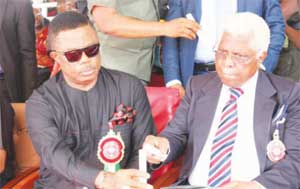Senior Correspondent, OKEY MADUFORO, who witnessed the memorial ceremony of Igbo indigenes who lost their lives during the civil war and other violent disturbances in the country and beyond, presents the excerpts of the event.
It was a solemn occasion at the Dr. Alex Ekwueme Square, Awka, Anambra State capital, on Monday, January 12, 2015. The day, which had been slated for the official burial of the fallen sons and daughters of Igboland, was under the supervision of Anambra governor, Willie Obiano. Second Republic Vice President, Dr. Alex Ekwueme, and ex-Biafran soldiers present.
The event had begun with interdenominational church service officiated by Church leaders in the area. Anglican Archbishop of Awka Diocese, Rt. Rev. Alexandra Ibezim, explained the essence of the gathering, noting that it was not merely a funfair, but an occasion for sober reflection.
He said: “This world is not our home; we are in the wilderness of life. What we have and see around us is very temporal. This special ecumenical service mandated and organised by Obiano is a memorial for the lives that were lost during the Nigerian Civil War which lasted between 1967 and 1970 and other wars in Europe and parts of Africa.
“There has never been service of this nature for the past 30 years. We, therefore, owe the governor immense gratitude for calling us together in joining in prayers to God for the repose of the souls of our departed one.”
In the same vein, the Catholic Archbishop of Awka Diocese, Most Rev Paulinus Ezeokafor, in his homily stated that the history of Nigeria cannot be complete without the civil war, nor would the history of the modern Igbo nation be complete without the war story.
His words: “It is an undeniable fact that the history of the modern Igbo nation cannot be complete without the narrative of the Nigerian-Biafran war. Besides, recent events in Nigeria history would remain incomprehensible without knowledge of that war. It is therefore my view that efforts should be made to promote greater awareness of that pivotal event in our lives as Ndigbo and as Nigerians. This is what the broadening of the scope of the celebration tries to initiate. However, memory can be abused. A community’s re-narration of its past can close the community off and hold it hostage to the past or it can open it up to a better and brighter future. All depends on the ethical and political commitment brought into the remembering. That is why what is remembered and how it is remembered are very important.
“As we mark the Armed Forces Remembrance Day, we celebrate the servicemen and women who have put their lives on the line for the life and safety of others. We are grateful for their patriotism and their spirit of sacrifice. As the celebration has been broadened in Anambra to commemorate also the victims of the civil war, the riots and insurgencies, we commend the initiative and enjoin all to imbibe the proper attitude of forgiveness and promise of a life lived in anticipation of the new heaven and the new earth that God is creating. To live such a life entails trusting God, as Job did, even when it seemed that God was unfair to him and allowed suffering and pains his lot.”
While the first part of the occasion was coming to an end, Obiano took the centrestage and painted the picture of true Igbo pan-Africanism in his address
“Umu nne m” (my brothers and sisters). He said: “We are the inheritors of an uncommon valour! This brave spirit inspires us to live above the common level. We are quick to climb over the pains of an awful experience and rebuild broken walls of friendship that will open fresh doors of hope. We do this with ease because we are a people of the faith. We believe in the centrality of God in the affairs of men. We are bold enough to accept the cruel verdict of fate and bury our dead with fanfare. Our culture upholds the centrality of ‘burial’ as a crucial epilogue in the narrative of life.”
The second stage of the ceremony took off with a speech delivered by Ben Gbulie, one of the organisers of the event, who incidentally is ex-Nigeria/Biafran military officer. In it, he lauded the spirit behind the event, describing it as thoughtful.
“I have never, since the end of the Nigerian civil war, dreamt for once that I would be asked to come and do this kind of job. I thank you all and the good people of Anambra. I condole with the entire bereaved people of Anambra who have suffered so much deprivation during the senseless civil war. I empathise with them and enjoin them to bear the loss with fortitude. I thank the governor for inaugurating the burial committee and appointing me as the chairman,” he said.
One of the active participants in the war, Joseph Achuzie (aka “Air Raid”), recalled how the fratricidal encounter started.
“I witnessed the pogrom and I witnessed our people being chased out of Northern Nigeria. The only thing we could do was to run homeward. It would be wrong for me to say that it was a senseless war. It was a war of necessity and we distinguished ourselves without running like cowards which they expected.
“I am happy and I am very satisfied because, as the Chinese say, ‘the journey of a thousand miles begins with a single step’. This is our first step. It goes to show that we haven’t forgotten our dead brothers and sisters during the war and during the pogrom. We learnt a lesson from it and that lesson has to be celebrated, so that our people will not forget,” he told TheNiche.
Many saw the event as falling into Igbo culture of organising a befitting burial of a missing loved one after some time. Among the highlights were cultural and masquerade dance presentations.














